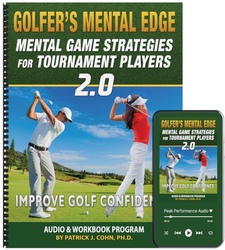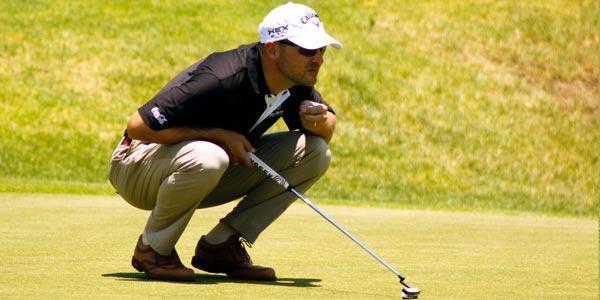The Many Layers of a Quiet Mind in Golf
Let’s face it: Golf is a huge mental game… When playing with a lot of confidence, golf is easy, fun, and feels effortless for most players.
When playing with no confidence because of mistakes or poor play, a strong mental game is needed most.
Your biggest challenge is to stay positive (and keep confidence) when not playing up to your expectations. Your own mental gremlins want to punish you for not performing well…
“I should never make bogey on that easy hole.”
“I need to find another sport to play after missing yet another three-footer.”
“I’ll probably dump this ball in the water because I’m hitting the ball so poorly today.”
PGA Tour player Tim Simpson was asked: “What’s the hardest thing to do in sports?”
He said to play relaxed and keep the mind quiet is the hardest thing to do in sports:
“To play totally relaxed. I’ve talked to Michael Jordan, Larry Bird and Mike Schmidt about it. Any athlete performs at his best when the mind is the quietest. That’s all sports psychology is — trying to quiet the mind to let your body play instinctively.”
~Tim Simpson
I agree with Tim – at least for some players. A quiet mind is essential for peak performance especially for golfers who over analyze and over control their performance.
However, I can think of many layers of a quiet mind…
One layer of a quiet mind is coping with poor shots or poor play. I recently published a CD program called *The Relaxed Athlete* to help players perform with a calm mind.
I think the hardest thing to do in golf is remain confident, composed, and not let your inner gremlins win when you under perform.
Fragile confidence can block any talented golfer from realizing his talent. If you have fragile confidence, you ride the confidence roller-coaster.
With fragile confidence, confidence decreases after one bad shot! When confidence wanes after poor shots, you can’t play with a quiet mind….
Doubt can overtake your thoughts. When working with my students, I make sure we address how to overcome doubt. This is a must if you want to ride a steady wave of confidence.
You might be unaware when doubt strikes. Your doubt may be just a tough habit to break. Or your doubt might even be a form of self-punishment after mistakes.
In any case, you must cap doubt quickly before it erodes confidence. Your first step is to recognize when your negative thoughts are over active.
To learn all my confidence-boosting strategies I teach my personal coaching students, I highly suggest you join my new confidence coaching program: Golfer’s Mental Edge course.
During my new course, I assess your mental game, give you a prescription to improve, coach you for eight weeks, and give you 365 days of continuing education.
Get all the details here:
Your Golf Confidence Coach,
Dr. Patrick Cohn
p.s. The Golfer’s Mental Edge Program coaching program starts this week. The last day to enroll is Tuesday, September 16 because we begin on Thursday this week. This is the most comprehensive golf psychology course I have ever given:
Related Sports Psychology Articles
- How to Perform Your Best at Tryouts
- Keeping Confidence When You Lack Momentum
- Keeping Confidence is Half the Battle for Athletes
*Subscribe to The Sports Psychology Podcast on iTunes
*Subscribe to The Sports Psychology Podcast on Spotify
Download a free sports psychology report to improve your mental game!
Learn more about our one-on-one mental game coaching.
Golfer’s Mental Edge

What’s the big sign that your mental game is the weak link in your golf game? When you can’t play consistently as well as when you play a practice or casual round–or your range game is way better than your game on the course. If you suffer from lack of focus, low self-confidence, poor composure or other mental game obstacles on the course, you can’t reach your true potential in golf.
The Golfer’s Mental Edge 2.0 Audio and Workbook program is ideal for any amateur, collegiate, junior, and tour professional golfer.
Golf coaches and instructors would also be wise to teach “The Golfer’s Mental Edge 2.0” principles to their players. This program is perfect for any golfer who wants to improve performance and consistency by managing their mind better on the course.

